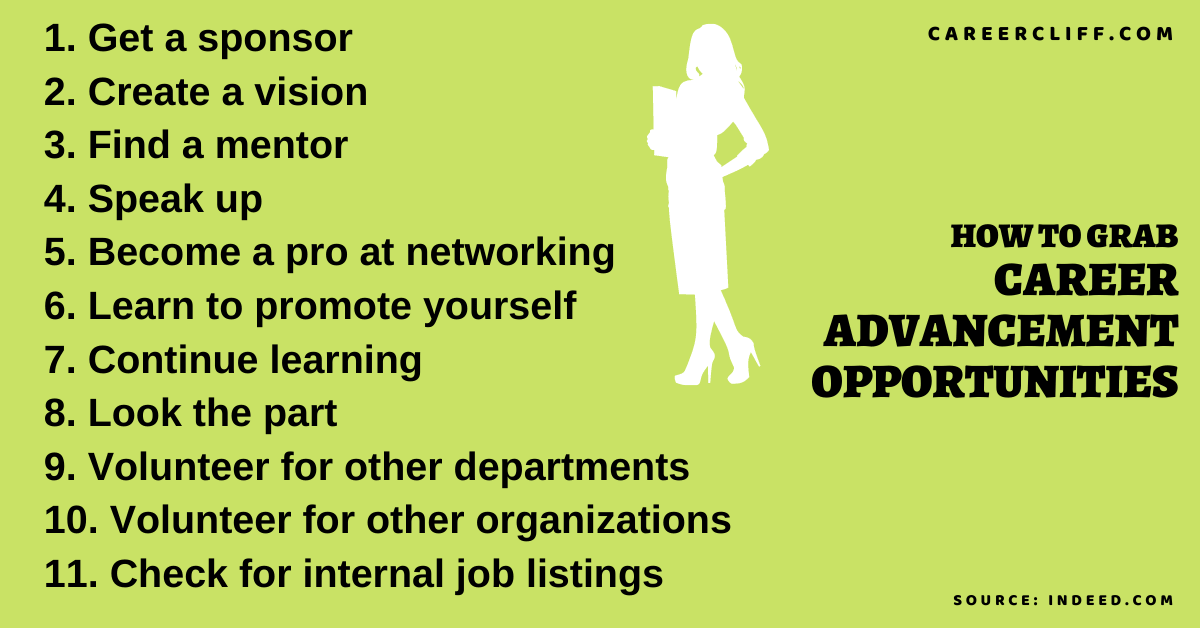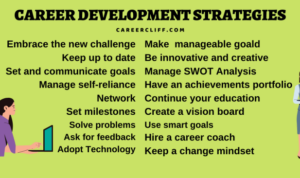Kicking off with Career Advancement Tips, this guide is here to help you level up your career game with style and substance. From setting clear goals to building a killer personal brand, we’ve got you covered. Let’s dive in and unlock your full potential!
Importance of Career Advancement

In today’s competitive job market, career advancement plays a crucial role in one’s professional growth. It is not just about climbing the corporate ladder but also about acquiring new skills, taking on more responsibilities, and expanding your knowledge base.
Benefits of Advancing in One’s Career
- Increased earning potential: Advancing in your career often comes with higher salaries and better compensation packages.
- Expanded network: Moving up in your career allows you to connect with more influential people in your industry.
- Personal growth: Career advancement provides opportunities for personal development and self-improvement.
- Job security: Advancing in your career can lead to greater job stability and security.
Career Advancement and Job Satisfaction
Career advancement has a direct impact on overall job satisfaction. When individuals feel like they are progressing in their careers, they are more likely to be motivated, engaged, and fulfilled in their roles. This sense of fulfillment can lead to increased productivity, better work performance, and a greater sense of purpose in the workplace.
Setting Clear Career Goals
Setting clear career goals is essential for guiding your professional journey and ensuring you stay on track towards success. By setting specific and achievable goals, you can focus your efforts and make progress in your desired career path. It is important to align these goals with your personal values and interests to ensure long-term satisfaction and fulfillment in your career. Here are some tips on how to set clear career goals:
Tips for Setting Specific and Achievable Career Goals
- Define your long-term vision: Start by envisioning where you want to be in your career in the long run. This will help you set clear objectives to work towards.
- Break it down: Break down your long-term goals into smaller, achievable milestones. This will make your goals more manageable and easier to track progress.
- Set deadlines: Assign realistic deadlines to each of your goals to create a sense of urgency and keep yourself accountable.
- Seek feedback: Get input from mentors, colleagues, or career counselors to ensure your goals are realistic and in line with industry standards.
Importance of Aligning Career Goals with Personal Values and Interests
Aligning your career goals with your personal values and interests is crucial for long-term satisfaction and motivation. When your goals resonate with what truly matters to you, you are more likely to stay committed and passionate about your work. This alignment also helps you make decisions that are in line with your values, leading to a more fulfilling career journey.
Examples of Long-term and Short-term Career Goals
| Long-term Career Goals | Short-term Career Goals |
|---|---|
| Attain a leadership position in my field within the next 7 years. | Complete a certification course in project management within the next 6 months. |
| Start my own business in the next 10 years. | Attend networking events to expand professional connections within the next 3 months. |
| Become a subject matter expert in a specialized area within the next 5 years. | Improve public speaking skills by enrolling in a workshop within the next 2 months. |
Skill Development for Advancement

In today’s competitive job market, continuously developing and improving your skills is crucial for career advancement. Employers are looking for individuals who can adapt to changing environments and possess a diverse set of skills. Here, we will discuss key skills necessary for career advancement, strategies for skill development, and the importance of continuous learning.
Key Skills for Career Advancement
- Leadership: The ability to lead and motivate teams is essential for moving up the career ladder.
- Communication: Strong communication skills, both verbal and written, are highly valued in any industry.
- Problem-solving: Employers seek individuals who can think critically and find innovative solutions to challenges.
- Adaptability: Being adaptable to new technologies and work processes is key for staying relevant in the workplace.
Strategies for Skill Development
- Take online courses: Platforms like Coursera and LinkedIn Learning offer a wide range of courses to help you acquire new skills.
- Attend workshops and seminars: Participating in industry events can provide valuable insights and networking opportunities.
- Seek mentorship: Learning from experienced professionals can help you hone your skills and gain valuable advice.
- Practice self-learning: Set aside time each week to learn something new or improve existing skills on your own.
Continuous Learning for Career Advancement
-
Learning is a lifelong journey
– Embracing a mindset of continuous learning allows you to stay ahead of the curve and adapt to changing industry trends.
- Stay curious: Keep exploring new areas of interest and be open to learning from different sources.
- Set learning goals: Establish clear objectives for skill development and track your progress to ensure continuous growth.
Building a Professional Network
Networking is a crucial aspect of career advancement as it allows individuals to connect with professionals in their field, discover new opportunities, and gain valuable insights and advice. Building a strong professional network can open doors to career growth and development.
Importance of Networking
Networking helps in creating relationships with like-minded professionals, potential mentors, and industry experts. It provides access to job opportunities, insider information, and career advice that can help in advancing one’s career.
Tips for Expanding and Maintaining a Professional Network
- Attend industry events, conferences, and seminars to meet new people and expand your network.
- Use social media platforms like LinkedIn to connect with professionals in your industry and engage in meaningful conversations.
- Join professional organizations and groups related to your field to meet like-minded individuals and build relationships.
- Follow up with your contacts regularly, stay in touch, and offer help or support when needed to maintain strong relationships.
Examples of Networking Opportunities
Online:
- Virtual networking events and webinars where professionals gather to discuss industry trends and share knowledge.
- LinkedIn groups and forums where professionals can connect, share insights, and seek advice.
- Professional networking platforms like Meetup, where individuals with similar interests can meet and network.
Offline:
- Industry conferences and trade shows where professionals come together to network and learn about the latest trends in their field.
- Local networking events and meetups organized by professional associations or chambers of commerce.
- Career fairs and job expos where individuals can network with potential employers and industry representatives.
Personal Branding and Visibility: Career Advancement Tips
Personal branding plays a crucial role in career advancement as it helps individuals stand out in a competitive job market. It involves how you present yourself professionally, both online and offline, and how others perceive you in the workplace. Building a strong personal brand can help you attract new opportunities, build credibility, and advance your career faster.
Strategies for Building a Strong Personal Brand
- Identify your unique strengths and skills that set you apart from others.
- Create a consistent professional image across all platforms, including social media profiles, resumes, and networking events.
- Showcase your expertise by sharing valuable content, writing articles, or speaking at industry events.
- Seek feedback from mentors or colleagues to understand how others perceive your personal brand.
- Be authentic and genuine in your interactions to build trust and credibility with others.
Tips on Increasing Visibility Within Your Industry
- Attend industry conferences, workshops, and networking events to connect with professionals in your field.
- Volunteer for leadership roles in professional organizations to demonstrate your expertise and commitment.
- Utilize social media platforms to share industry insights, engage with thought leaders, and increase your online presence.
- Collaborate on projects with colleagues from different departments to expand your network and visibility within the organization.
- Offer to mentor junior professionals or participate in speaking engagements to showcase your knowledge and skills.
Seeking Mentorship and Guidance
Seeking mentorship and guidance can significantly impact your career advancement journey by providing valuable insights, advice, and support from someone who has been through similar experiences before.
Benefits of Having a Mentor
Mentors can offer guidance based on their own experiences, help you navigate challenges, provide constructive feedback, and open doors to new opportunities. They can also help you expand your professional network and offer a different perspective on your career goals.
Tips for Finding a Suitable Mentor
- Identify your goals and what you hope to gain from a mentorship relationship.
- Look for someone who is experienced in your field and shares similar values or interests.
- Reach out to potential mentors through networking events, professional organizations, or social media.
- Be open to feedback and willing to learn from your mentor’s experiences.
Establishing a Mentor-Mentee Relationship
- Set clear expectations and goals for the mentorship relationship.
- Communicate regularly and openly with your mentor about your progress and challenges.
- Show gratitude and appreciation for your mentor’s time and guidance.
- Be receptive to feedback and willing to make changes based on your mentor’s advice.
Accelerating Career Growth with Mentorship, Career Advancement Tips
Mentorship can accelerate career growth by providing access to valuable insights, knowledge, and opportunities that can help you advance faster in your field. A mentor can help you avoid common pitfalls, make informed decisions, and navigate career transitions more smoothly.
Overcoming Career Plateaus
Feeling stuck in your career? It’s time to break free from that plateau and take your professional life to the next level.
Seek New Challenges and Opportunities
One of the best ways to overcome a career plateau is to seek out new challenges and opportunities. Stepping out of your comfort zone can help you grow professionally and open up new doors for advancement.
Reinvent Yourself Professionally
Don’t be afraid to reinvent yourself professionally. Update your skills, explore new industries, or even consider a career change if necessary. Embracing change can help you overcome career plateaus and reach new heights in your professional journey.


